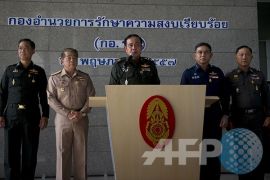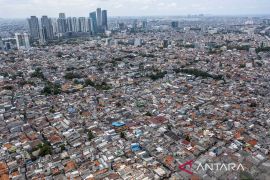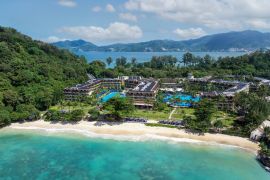Sombat Boonngamanong, who spearheaded an online campaign to stage illegal flashmob rallies against the military takeover, was arrested late Thursday in Chonburi province southeast of Bangkok, army spokeswoman Sirichan Ngathong said.
"We have a team who tracked him through the Internet," she told AFP.
"He faces initial charges of violating an order to report to the junta," she said, an offence that carries a possible punishment of two years in prison.
Sombat was one of several hundred people -- including politicians, activists, academics and journalists -- summoned by the military following its May 22 coup.
Those who attended were detained in secret locations for up to a week and ordered to cease political activities.
Sombat, a prominent pro-democracy activist, refused to turn himself in, instead posting a message on Facebook saying: "Catch me if you can".
Since then he has urged followers to stage peaceful public demonstrations, flashing the three-finger salute from "The Hunger Games" films that has become a symbol of defiance against the junta.
A second military official said Sombat would be detained at an army facility for up to one week.
"During that time the military will question him on his movements, behaviour and his incitement," said the official, speaking on condition of anonymity.
Sombat would then face further interrogation by the police and appear before a military court, he added.
The activist is the leader of a faction of the "Red Shirts" movement, which broadly supports fugitive former premier Thaksin Shinawatra and his sister Yingluck, who was deposed as prime minister last month.
Ministers detained
A minister in Yinglucks ousted cabinet who also refused to answer the summons was detained by soldiers in a dramatic swoop on a press conference late last month, and faces trial in a military court.
If convicted, ex-education minister Chaturon Chaisang could be imprisoned. He had used a press conference to criticise the coup minutes before being arrested.
Chaturon was due to appear in court on Friday for a second remand hearing.
Yingluck was herself summoned and held temporarily at an undisclosed location after the coup.
The junta says she has since been released and allowed to return home although she remains under military supervision and has not been seen in public since.
Yingluck had faced nearly seven months of mass opposition protests leading up to the coup. Shootings and grenade attacks linked to the rallies left 28 people dead and hundreds wounded, including many opposition demonstrators.
The junta has imposed martial law, media censorship and a night-time curfew as part of what it says is an attempt to end years of political turmoil.
It mounted a show of military strength over the weekend, deploying soldiers to deter small but defiant anti-coup rallies that popped up outside shopping malls and near train stations in Bangkok.
Critics see the coup as a pretext for a long-planned power grab by the military-backed royalist establishment to purge politics of the influence of Thaksin, who was himself ousted by the army in 2006.
The billionaire tycoon-turned-populist politician lives in Dubai to avoid jail for a corruption conviction.
Thaksin or his allies have won every election in more than a decade, helped by strong support in the northern half of the country, including in 2011 under Yingluck.
The junta has said elections are not expected to be held for at least a year to allow political "reforms" including the drafting of a new constitution, despite international appeals for a return to democracy.
(S022/H-AK)
Editor: Ella Syafputri
Copyright © ANTARA 2014











